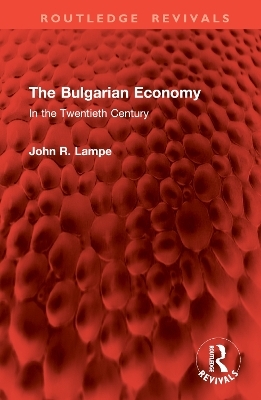
The Bulgarian Economy
In the Twentieth Century
Seiten
2024
Routledge (Verlag)
978-1-032-91715-3 (ISBN)
Routledge (Verlag)
978-1-032-91715-3 (ISBN)
- Noch nicht erschienen (ca. Dezember 2024)
- Versandkostenfrei innerhalb Deutschlands
- Auch auf Rechnung
- Verfügbarkeit in der Filiale vor Ort prüfen
- Artikel merken
First published in 1986, The Bulgarian Economy (now with a new preface by the author) traces rapid growth of the Bulgarian economy throughout 20th century. It notes the obstacles Bulgaria has faced in bringing about industrial development in a small relatively poor country where, in the early 20th century, agriculture predominated.
First published in 1986, The Bulgarian Economy (now with a new preface by the author) traces the rapid growth of the Bulgarian economy throughout the twentieth century. It also notes the obstacles Bulgaria has faced in bringing about industrial development in a small relatively poor country where, in the early twentieth century, agriculture predominated. It explores the difficulties which have arisen because of the unusual domination of a relatively isolated capital city, Sofia, over the rest of the country. It examines the effects of Bulgaria’s being on the losing side in three wars. An abrupt change in economic strategy and management came with the Communist accession to power in 1944 and with the simultaneous reorientation from close ties with Germany to close ties with the Soviet Union. The book shows, however, that significant state control had appeared well before this transition and that there is much in common between the pre- and post-war periods. It goes on to emphasise economic growth and structural change in the post-war period and the unusually large role of foreign trade. The reforms which have taken place since 1960 are accorded a separate, final chapter.
First published in 1986, The Bulgarian Economy (now with a new preface by the author) traces the rapid growth of the Bulgarian economy throughout the twentieth century. It also notes the obstacles Bulgaria has faced in bringing about industrial development in a small relatively poor country where, in the early twentieth century, agriculture predominated. It explores the difficulties which have arisen because of the unusual domination of a relatively isolated capital city, Sofia, over the rest of the country. It examines the effects of Bulgaria’s being on the losing side in three wars. An abrupt change in economic strategy and management came with the Communist accession to power in 1944 and with the simultaneous reorientation from close ties with Germany to close ties with the Soviet Union. The book shows, however, that significant state control had appeared well before this transition and that there is much in common between the pre- and post-war periods. It goes on to emphasise economic growth and structural change in the post-war period and the unusually large role of foreign trade. The reforms which have taken place since 1960 are accorded a separate, final chapter.
John R. Lampe is Professor Emeritus of History at University of Maryland, USA. He served as Director of the East European Studies program at the Woodrow Wilson International Center for Scholars in Washington from 1987 to 1997. He was a Fellow at the Center in 2003–4 and has been a Senior Scholar there since 2007.
Introduction 1. Initial Growth, 1878–1918 2. Recovery in the 1920s 3. Isolation in the 1930s 4. The Second World War 5. Communist Revolution, 1944–1947 6. The First Five-Year Plans 7. Industry and Agriculture since 1960 8. Foreign Trade and Domestic Living Standards 9. Economic Reforms since 1960 Conclusion
| Erscheint lt. Verlag | 2.12.2024 |
|---|---|
| Reihe/Serie | Routledge Revivals |
| Verlagsort | London |
| Sprache | englisch |
| Maße | 156 x 234 mm |
| Themenwelt | Geisteswissenschaften ► Geschichte ► Regional- / Ländergeschichte |
| Geschichte ► Teilgebiete der Geschichte ► Wirtschaftsgeschichte | |
| ISBN-10 | 1-032-91715-6 / 1032917156 |
| ISBN-13 | 978-1-032-91715-3 / 9781032917153 |
| Zustand | Neuware |
| Haben Sie eine Frage zum Produkt? |
Mehr entdecken
aus dem Bereich
aus dem Bereich


